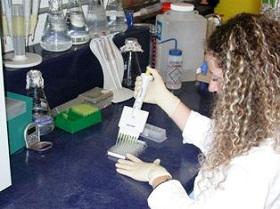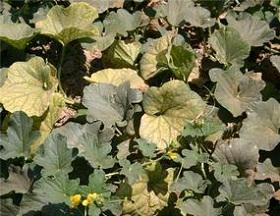Using AI to control energy for indoor agriculture
30 September 2024
Published online 9 January 2011

Farmers in Lebanon whose crops have long been plagued by plant diseases have reason to celebrate. Researchers at the American University of Beirut (AUB), Lebanon, have developed new plant virus detection kits for diseases that reduce crop yields and cause economic loss throughout the country.
The new ELISA (enzyme-linked immunosorbant assays) kits detect cucurbit yellow stunting disorder virus (CYSDV), which infects cucumbers, melon, squash and watermelon, and prune dwarf virus (PDV), which infects stone fruits like peach, almond, and nectarine.
CYSDV cannot be detected using serological tests, and scientists considered it too difficult to purify the virus in sufficient quantities to make antibodies. "This is because the virus particles are labile, and the virus is present only in the phloem cells, therefore having a relatively low concentration," says Yusuf Abu Jawdah, a plant pathologist at AUB who led the research.
Jawdah was prompted to begin his research in 2001 by the complaints of low crop yields by farmers. In Lebanon, CYSDV infections of greenhouse-grown cucumbers are estimated to result in approximately a 50% loss of productivity.
Each virus species has a unique coat protein (CP). Preparing antibodies that stick to this particular protein can be used to detect the presence of the virus. However, in order to produce these antibodies, researchers need to obtain large quantities of the CP. The low concentration of CYSDV in plants makes this particularly tricky.

"We searched for the sequence of the CP of the virus, and designed specific primers. Using polymerase chain reaction we amplified millions of copies of the full CP gene, cloning it to allow for expression of the gene," explained Jawdah. "This was used to transform a bacterium which when placed in an appropriate culture medium allowed us to obtain the protein." Finally, the protein was injected into a rabbit. The rabbit's serum was then used to obtain purified antibodies, which were used to develop ELISA detection systems for CYSDV.
This technique was then applied to stone fruit viruses, and the results were successful for PDV. This led to the development of antibodies with better selectivity and sensitivity than those that were commercially available.
The ELISA kits will provide a commercial boost for Lebanon, as they can be used worldwide. "We were always importers of kits. Now we are at the stage of producing kits and exporting them," said Jawdah. However, the kits are being marketed by a Swiss firm. Jawdah said that, to his knowledge, no Lebanese or Arab firm currently has a stake in this market.
While the research is a breakthrough for Lebanon, Mohammed Jeenah, executive director of the Agricultural Research Council in South Africa, doesn't think it will have much impact beyond the Middle East region. "These tests are already available in developed countries and some advanced developing countries," he says.
However, he adds, "The advance is important for Lebanon as it will bring down the costs for Lebanese farmers and will increase yields in the region."
Early detection through use of the kits will allow farmers to take preventive measures to stop the spread of these diseases. "Nurseries with the help of government institutions should test and certify that seedlings are free from viruses to ensure that the farmer will get good yields. Under field conditions there is no cure for virus diseases," warns Jawdah.
doi:10.1038/nmiddleeast.2011.242
Stay connected: